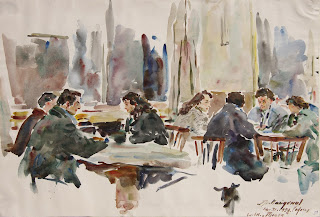Who
were the organisations and people whose stance on things I admired – and how could
someone like myself help them achieve more? That is the basic question I have tried
to address on various occasions over the past decade. In my various musings I’ve
referred to a lot of books – but have not yet really tried to give a definitive
answer to this question of whose voices and messages we should be listening to.
I’m
reminded of one of Tolstoy’s fables – the Three Questions about a king who wants to know the best moment for taking a decision; the best people
whose advice to listen to; and “how he might know what was the most important
thing to do.”
His
courtiers give him conflicting views about these 3 questions as a result of
which he decides to seek the advice of a wise hermit. He disguises himself in
simple clothes and dismisses his bodyguards and finds the hermit, frail and
weak, digging his garden with some difficulty. He states his reason for coming
but then takes pity on the old man and takes over the digging. He repeats his
questions but gets no answer. He’s about to leave when a wounded man staggers
to the hermit’s. The man falls unconscious and the king dresses his wounds but then,
tired by his exertions, falls asleep. When he awakes, the stranger is standing
over him – and asks the king to forgive him. It turns out that the stranger,
apparently, wronged by the king, had been planning to kill him but had been
surprised and wounded by the king’s bodyguard. Now, he is so touched by the
king’s kindness that he wants instead to serve him. The story continues -
The
King approached the hermit, and said, "For the last time, I pray you to
answer my questions, wise man.""You
have already been answered!" said the hermit still crouching on his thin
legs, and looking up at the King, who stood before him.
"How
answered? What do you mean?" asked the King.
"Do
you not see," replied the hermit. "If you had not pitied my weakness
yesterday, and had not dug these beds for me, but had gone your way, that man
would have attacked you, and you would have repented of not having stayed with
me. So the most important time was when you were digging the beds; and I was
the most important man; and to do me good was your most important business.
Afterwards, when that man ran to us, the most important time was when you were
attending to him, for if you had not bound up his wounds he would have died
without having made peace with you. So he was the most important man, and what
you did for him was your most important business.
Remember
then: there is only one time that is important -- and that is now! It is the
most important time because it is the only time when we have any power.
The
most necessary man is he with whom you are, for no man knows whether he will
ever have dealings with anyone else.
And
the most important thing to do is, to do good, because for that purpose alone
was man sent into this life!"
I’m
not sure if I really accept the second of the answers – about the most important
person being the one in whose company we presently find ourselves – not least
because we can and do exercise some choice about the company we keep. But I
have been dithering long enough in my quest – and do agree with Tolstoy that “doing
good” should be a key factor in our approach to life. Of course, in this
cynical age, it is easy to deride this as facile – “give me a definition!” is the
cry. But I think we all know how much time we spend on trivial or reprehensible
activities with base motives.
I
hope to spend some of the next few days looking at the questions – trying to
identify the sane voices.
It’s
obvious that systems no longer work. Perhaps, however, the original question needs first
to be rephrased, for example, thus -
- How can we restore faith in institutions - in people?
- How
do we select the most appropriate and effective social intervention?
- How can we develop a consensus about that?









